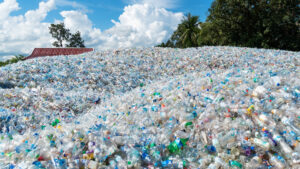By Cressida Bowyer, Keiron Roberts and Stephanie Northen, University of Portsmouth
Recycling was once considered the obvious solution to the excessive amount of new (or virgin) plastic produced each year. This is no longer realistic. Global recycling capacity simply cannot keep up with the taking, making and wasting of natural resources.

Growing mountains of plastic waste are accumulating in the poorest countries as affluent nations such as the United Kingdom ship their recycling overseas. But some nations are importing far more plastic waste than they can possibly recycle.
The recycling process itself also creates problems. A new report by Greenpeace and the International Pollutants Elimination Network has revealed how plastics which are made with or come into contact with toxic chemicals, such as flame retardants, can contaminate the recycling process by spreading these toxins through subsequent batches of plastic waste. Another recent study showed that recycling facilities can release hundreds of tons of microplastics into the environment each year.
Only 6-9% of all plastic ever produced has been sent for recycling. Although plastic and other waste is collected for recycling in most countries, the amount of material that is remade into the same or similar products (what is called closed-loop recycling) is extremely low. Only 2% of plastic waste is recycled in a closed loop and not turned into something of lower quality, which is called downcycling. Recycling can not fully replace virgin material as it can only be recycled twice before losing necessary properties, and so most recycling results in a downgraded material that cannot be used for the same purpose.
A more sustainable approach would prioritize preventing plastic waste by taking action at earlier stages of a plastic product’s lifecycle: reducing how much plastic is ultimately made, reusing what exists and replacing plastic with alternative materials where appropriate.
Reduce
Manufacturers must stop making so much unnecessary plastic to reduce the amount entering the economy. There is no case for making plastics that are impossible to collect, reuse or recycle, or are toxic. Yet they are abundant: think multilayered sachets, thin films and wrappers. These should be phased out as a priority.
Global caps on plastic production could restrict its use to reusable products and packaging, reducing the pressure on recycling systems.
You can refuse single-use packaging when shopping if alternatives are available and affordable. Choose loose vegetables, or products wrapped in packaging that can be refilled.
Reuse
Using the plastic you already have for as long as possible reduces the amount of new products and packaging that need to be made and how much waste is ultimately sent for recycling.
Roughly 250 billion single-use coffee cups are used worldwide every year – a figure that could be slashed by governments setting national mandates for reusable cups and bottles. This might involve shops, cafés and other venues providing reusable packaging for any products they sell and ensuring each one is used, tracked, washed, returned and replenished for the next consumer cycle.
Substitute
Metals, glass or paper can be used instead of plastic, but there is no universal sustainable alternative. The most appropriate material depends on the item’s use.
The environmental consequences of any material should be rigorously assessed across its entire life cycle – from production to use and disposal – to ensure it does more good than harm. And such assessments must consider all social, environmental and economic costs.
The true cost of making, distributing and disposing of plastic is estimated to be more than 10 times greater than what the customer pays for the product. Including the hidden costs of environmental damage and human misery arising from pollution in the price of virgin plastic, by taxing manufacturers or retailers for instance, could boost the economic case for alternatives.
Recycling can still be useful
Not all plastics can be reused, especially medical devices. When all alternatives have been exhausted, recycling keeps material in the economy and temporarily delays the need for more virgin plastic. But the existence of recycling shouldn’t justify making more plastic.
Recycling must not pollute. Manufacturers should only make plastics which can be recycled via methods proven to be safe and clean, and ban toxic additives. Simple labelling can help consumers make informed decisions about how, where and what to either reuse or recycle, which would help prevent recycling loads becoming contaminated with non-recyclable waste and toxins.
Plastics sent for recycling should be treated in the most socially and environmentally responsible way. High-income countries which export waste to poorer countries for cheap recycling do so without guarantees that infrastructure exists to manage this waste where it ends up. The result is waste leaking into the environment, and toxic plastic blocking drainage channels and causing floods. Some of this is burned outdoors, which comes with its own risks to health and the environment. Banning or restricting exports would help.
Precarious workers in the informal waste sector collect, sort and sell recyclable materials and carry out 60% of global recycling. Waste reclaimers endure poor health and low pay but their extensive knowledge is invaluable and must be acknowledged. Policies to protect their rights and improve their livelihoods are needed.
Countries meeting in Paris for the second of five rounds of negotiations for an international treaty to end plastic pollution will discuss all areas of the plastic lifecycle – from the extraction of material to manufacturing, use and disposal. Banning unnecessary plastics, toxic additives and waste exports should be high on the agenda, along with schemes to encourage reuse and repair.
Cressida Bowyer is a senior research fellow and deputy director of Revolution Plastics at the University of Portsmouth; Keiron Roberts, is a senior lecturer in sustainability and the built environment at the University of Portsmouth, and Stephanie Northen is a research associate at Revolution Plastics at the University of Portsmouth.
This article is republished from The Conversation under a Creative Commons license. Read the original article.
Sign up for The Invading Sea newsletter by visiting here.



